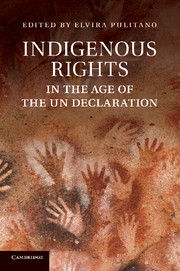11 results
Acknowledgments
-
- Book:
- Indigenous Rights in the Age of the UN Declaration
- Published online:
- 05 June 2012
- Print publication:
- 24 May 2012, pp xiv-xvi
-
- Chapter
- Export citation
Dedication
-
- Book:
- Indigenous Rights in the Age of the UN Declaration
- Published online:
- 05 June 2012
- Print publication:
- 24 May 2012, pp v-vi
-
- Chapter
- Export citation
Indigenous Rights in The Age of The UN Declaration - Half title page
-
- Book:
- Indigenous Rights in the Age of the UN Declaration
- Published online:
- 05 June 2012
- Print publication:
- 24 May 2012, pp i-ii
-
- Chapter
- Export citation
11 - Kānāwai, international law, and the discourse of indigenous justice:
-
-
- Book:
- Indigenous Rights in the Age of the UN Declaration
- Published online:
- 05 June 2012
- Print publication:
- 24 May 2012, pp 299-326
-
- Chapter
- Export citation
Indigenous Rights in The Age of The UN Declaration - Title page
-
-
- Book:
- Indigenous Rights in the Age of the UN Declaration
- Published online:
- 05 June 2012
- Print publication:
- 24 May 2012, pp iii-iii
-
- Chapter
- Export citation
Indigenous rights and international law:
-
-
- Book:
- Indigenous Rights in the Age of the UN Declaration
- Published online:
- 05 June 2012
- Print publication:
- 24 May 2012, pp 1-30
-
- Chapter
- Export citation
Index
-
- Book:
- Indigenous Rights in the Age of the UN Declaration
- Published online:
- 05 June 2012
- Print publication:
- 24 May 2012, pp 337-352
-
- Chapter
- Export citation
Contents
-
- Book:
- Indigenous Rights in the Age of the UN Declaration
- Published online:
- 05 June 2012
- Print publication:
- 24 May 2012, pp vii-viii
-
- Chapter
- Export citation

Indigenous Rights in the Age of the UN Declaration
-
- Published online:
- 05 June 2012
- Print publication:
- 24 May 2012
Copyright page
-
- Book:
- Indigenous Rights in the Age of the UN Declaration
- Published online:
- 05 June 2012
- Print publication:
- 24 May 2012, pp iv-iv
-
- Chapter
- Export citation
Notes on contributors
-
-
- Book:
- Indigenous Rights in the Age of the UN Declaration
- Published online:
- 05 June 2012
- Print publication:
- 24 May 2012, pp ix-xiii
-
- Chapter
- Export citation



